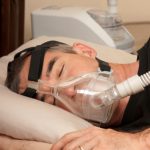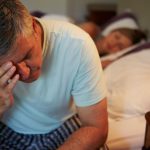 Snoring can be seen as a few different things. For some it signals being in a deep sleep; for others – mainly the individual sharing the bed with you – it can be a complete nuisance and prevent them from sleeping.
Snoring can be seen as a few different things. For some it signals being in a deep sleep; for others – mainly the individual sharing the bed with you – it can be a complete nuisance and prevent them from sleeping.
Although both of these can be true, snoring can also be an indication of a health risk, so getting to the bottom of your snoring is vital.
Advertisement
What we are talking about is sleep apnea and it goes far beyond the realm of deep sleeping and just regular snoring. Sleep apnea is a serious health condition, which if left untreated can lead to a slew of other health concerns.
What is sleep apnea?
 Sleep apnea is a condition which occurs while we sleep. Not only does sleep apnea result in loud snoring, but it actually affects how the individual breathes while asleep. So much so that the person may stop breathing for brief moments throughout the night. These pauses in breathing can last between 10 to 20 seconds but are long enough to start causing damage to your health.
Sleep apnea is a condition which occurs while we sleep. Not only does sleep apnea result in loud snoring, but it actually affects how the individual breathes while asleep. So much so that the person may stop breathing for brief moments throughout the night. These pauses in breathing can last between 10 to 20 seconds but are long enough to start causing damage to your health.
In fact, because you stop breathing your body jolts, which wakes you up. This means you never enter the deep sleep necessary for next-day energy. Oftentimes, people with sleep apnea will be fatigued, lack energy and concentration and be groggier the following day.
Sleep apnea has been linked to blood pressure problems, diabetes, weight gain and heart disease, so managing it can keep you healthier overall.
Types of sleep apnea
There are numerous types of sleep apnea which affect different parts of the brain and throat. Knowing which kind you have can help you find a suitable, effective treatment.
Obstructive sleep apnea: This form of sleep apnea involves an obstruction in the throat. Basically the tissue at the back of the throat relaxes blocking the airway. This results in loud snoring.
Central sleep apnea: A less common form of sleep apnea, this type is caused by the nervous system not sending signals to the brain which control breathing. Snoring is not a sign of this type of sleep apnea, but lack of breathing is a typical symptom.
Complex sleep apnea: This type of sleep apnea combines both obstructive and central sleep apnea so the individual has aspects of both.
Sleep apnea causes and risks
As mentioned with the different types of sleep apnea, some causes are either an obstruction in the back of the throat or missed signals in the nervous system. But some other sleep apnea causes and risks are the following:
- Heart failure, stroke or tumor – most common in central sleep apnea
- Being overweight
- Having a thicker neck
- Having narrow airways
- Males get sleep apnea more so than females
- Age – most commonly seen in those 60 years and older
- Family history
- Race – African Americans are more likely to develop sleep apnea
- Use of alcohol, sedatives and muscle relaxers
- Smoking
- Nasal congestion.
Although some of these risk factors are unavoidable, other lifestyle factors can be worked on to lower your risk of developing sleep apnea.
Sleep apnea symptoms and common signs
 Depending on the type of sleep apnea, there may be loud snoring or very minimal snoring, so it’s equally as important to take note of some of these other sleep apnea symptoms:
Depending on the type of sleep apnea, there may be loud snoring or very minimal snoring, so it’s equally as important to take note of some of these other sleep apnea symptoms:
- Daytime tiredness
- Waking up with a dry mouth or sore throat
- Morning headache
- Difficulty remaining asleep
- Lack of concentration and focus
- Sudden awakening throughout the night followed by shortness of breath.
If these other signs of sleep apnea are present in your life – in combination with snoring and pauses in breathing – speak with a doctor before it starts to affect other aspects of your health.
Sleep apnea and other health conditions
As we’ve said, sleep apnea can affect other aspects of your health. Here are some common health risks which can develop if sleep apnea is not managed:
Sleep apnea and diabetes: Sleep apnea and diabetes commonly are found to coexist because they share a common risk factor: Being overweight. Another serious risk factor for diabetes is lack of sleep; because sleep apnea disrupts sleep, it can increase the risk of developing diabetes as well.
Sleep apnea and hypertension: Research from University of Wisconsin Medical School, published in the New England Journal of Medicine, outlined the relationship between sleep apnea and hypertension. The researchers observed 700 participants for more than eight years to reveal that even mild sleep apnea was enough to cause hypertension. When breathing is paused, carbon dioxide builds up in the bloodstream, making the heart work that much harder.
Sleep apnea and heart disease: Because sleep apnea can contribute to hypertension and diabetes, the risk of heart disease also rises. The Mayo Clinic reported on research that people with sleep apnea are at greater risk of heart attack while asleep. The condition also has been linked to coronary artery disease if left untreated.
Tips to help manage and treat sleep apnea
 If you suspect you have sleep apnea, talk to your doctor. The most common treatment for sleep apnea is to use what is called a CPAP machine – continuous positive airway pressure. This device is a facial mask worn during sleep which supplies a constant and steady air pressure to open airways and promote breathing.
If you suspect you have sleep apnea, talk to your doctor. The most common treatment for sleep apnea is to use what is called a CPAP machine – continuous positive airway pressure. This device is a facial mask worn during sleep which supplies a constant and steady air pressure to open airways and promote breathing.
Other means of preventing and managing sleep apnea include:
- Managing your weight – obesity is a common risk factor of sleep apnea
- Limiting alcohol use
- Quitting smoking
- Treating nasal congestion and ensuring breathing airways are open
- Sleeping on your side as opposed to your back.
By following these simple tips, you can successfully manage and prevent sleep apnea and the other associated health conditions.
Getting a good night’s rest is vital for good health, so if you’re not getting in a restful sleep, consider it a wake-up call to action. If you’re concerned about sleep apnea, speaking with your doctor is your best bet. Knowing your risk factors is also important as it can help detect your condition when it’s at its mildest.
Related Reading:
Hypertension linked to poor sleep
When it comes to high blood pressure – or hypertension – there are many factors that come into play: Diet, weight, smoking and alcohol use can all be attributed to your rising blood pressure. But does lack of sleep increase hypertension? In fact, it does. Getting a good night’s rest not only determines your energy level the next day, but plays a large role in hypertension.
Sleep troubles put you at risk for pneumonia
Advertisement
Tired, so tired, of waking up and moving to the couch to get a decent night’s rest? Your partner’s snoring may not just be disturbing your sleep – it may be a sign of an underlying sleep condition known as sleep apnea. People who suffer from the disorder may be at an increased risk of developing pneumonia, according to a recent study published in the Canadian Medical Association Journal.
Your lack of sleep can cause heart disease
There is a slew of health conditions which are plaguing Americans. From diabetes, to blood pressure these are just some health concerns wreaking havoc on the health of Americans…Read more
